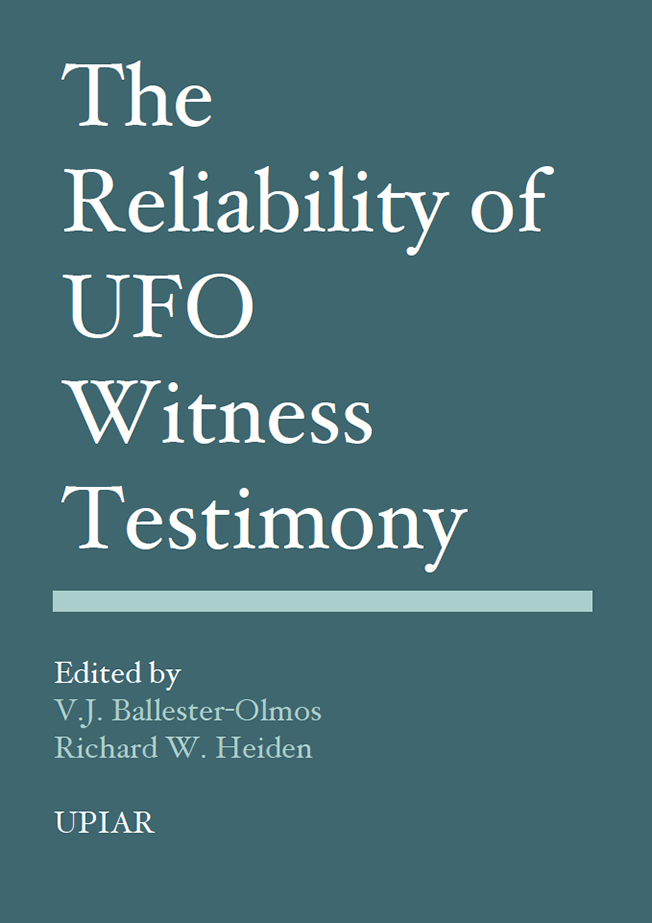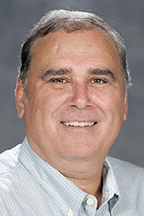As an editorial assistant with Middle Tennessee State University’s Information Technology Division, Craig Myers obviously still taps into the journalistic skills he developed during a 25-year career in daily newspapers.
And it was a quirky, high profile story that he covered in the late 1980s and early 1990s that led to his contribution to a recently published book about the reliability — or lack thereof — of eyewitnesses to UFOs.

“The Reliability of UFO Witness Testimony” is a collection of papers edited by V.J. Ballester-Olmos and Richard W. Heiden, described as “the first major book to comprehensively focus on the discussion and current views on problems and challenges posed by the reliability of UFO testimonies.”
It’s a cross-disciplinary compendium of papers by 60 authors from 14 different countries who are specialists in social, physical and biological sciences, predominantly psychology.
Myers’ chapter is titled “The MUFON-ian Candidate: The Gulf Breeze UFO Case as Political Contest” and stems from his time as a reporter at the Pensacola News Journal, “my first real newspaper job,” he says.
Part of his coverage responsibilities then included the Pensacola suburb of Gulf Breeze, Florida. Myers began hearing about a local personality named Ed Walters and his UFO “sightings,” captured on a Polaroid camera, that were subsequently elevated by the high-profile promotion of the Mutual UFO Network, or MUFON, an international organization that investigates UFO reports from around the globe.
The sightings phenomenon and the polarizing effect it was having on the community led to dozens of stories and eventually worked its way into the political realm when Walters tried unsuccessfully to leverage his notoriety and host of UFO-sighting supporters into a seat on the local city council.

“At first, the stories were more feature stories. They were more, ‘Hey, this crazy thing is going on. It’s sort of fun and interesting,'” Myers recalls. “Then after a while, we began to think something more serious was going on, mainly because Ed Walters was seeking attention, and he also was beginning to make … pretty decent money off this whole story.”
Walters was paid to write a book on the sightings.
“And so he became what we would call a public figure by choice. … So we decided maybe our coverage should be a little more … skeptical of what was going on, because he was really using that entire community to promote himself. And these were the days, of course, before the internet, social media, but this story was going viral.”
Walters’ self-promotion led to appearances on “Oprah,” and the case, which some called the Gulf Breeze phenomenon, would later make its way into an episode of the TV documentary series “Unsolved Mysteries” and one from the first season of the wildly popular science fiction series “The X-Files,” “E.B.E.”
‘I’m even more skeptical now’
In his chapter’s preamble, Myers states: “Let me start with a confession: ‘The Reliability of UFO Witness Testimony’ is a topic beyond my experience and expertise. Before you skip on to another chapter, let me elaborate. I am a recovering newspaper reporter whose second career act has taken him into the strange new world of academia, exposing me to some theories and research relevant to this topic.”
Myers earned a master’s degree in international affairs from MTSU in 2022 after graduating from Troy University in 1986 with a major in journalism and minors in French and history, then embarked on a two decade-plus career as a reporter and editor for newspapers in Florida and Alabama, covering local, state and federal government, the criminal justice system, education, sports and more.

Myers was a staff reporter at the Pensacola News Journal from 1989 to 1995 with coverage that included local news, politics, history, economic development, sports and education. It was at the PNJ that he says he investigated and debunked the infamous Gulf Breeze UFO case, at one point interviewing a couple who discovered a model UFO in the attic of Walters’ former residence as well as a witness who described how he helped Walters fake the Polaroid photos.
Myers even wrote his own book on the subject, titled “War of the Words,” that is available on Amazon. A link to that book that one of the editors of “The Reliability of UFO Witness Testimony” discovered on the academia.edu site led them to Myers and to soliciting his contribution.

Myers says one of the concepts he studied at MTSU while earning his master’s, called social identity theory, helped him develop the idea for his chapter contribution to the UFO book. The theory basically posits that individuals get a portion of their identity from membership in a relevant social group, which leads to an in-group, out-group dynamic — in the Gulf Breeze case, making UFO believers the in-group and skeptics the out-group.
Myers says the UFO book editors wanted him to present both sides of the sightings’ dynamic within the community — Walters and his die-hard believers, including prominent citizens in the community, versus other prominent community members, such as the mayor and police chief who were very skeptical — along with Myers himself, whose skepticism continues to this day.
“Back then the technology was very shaky and yet he (Walters) was able to pull this off. Today you have Photoshop, you’ve got CGI (computer-generated imagery). Now you’ve got AI (artificial intelligence). I don’t believe anything I see on YouTube or social media or anything right now,” he chuckles. “I’m even more skeptical now because … even drones, think about drones. You’ve got these advanced drones and people can fly formation drones and all this stuff. So I’m even more skeptical now.”
Myers says writing the chapter, roughly a three-month process, brought back a lot of good memories from his newspaper days. He says he’s even used the Gulf Breeze coverage as a part of journalism courses he’s taught previously on campus as a good example of public service and investigative journalism “and how to follow a trail.”
So does Myers believe in UFOs?
“If you mean literally unidentified flying objects, of course. You know, I can’t identify everything I see. I come from a Christian worldview, so I believe in the supernatural. That’s the basis of the Christian faith, is the supernatural. But I don’t believe that God’s particular plan for us here on Earth involves life on other planets. I think his plan for us is different.”
Myers has worked in MTSU’s ITD since 2016, writing about technology in higher education. In 2019 he completed a Russian language course. From fall 2019 to December 2022 he studied for the master’s degree in international affairs, completing a practicum in summer 2022 that involved helping start a Christian NGO called Kingdom Bridges that worked with churches in Moldova and Ukraine to help those affected by war.
— Jimmy Hart (Jimmy.Hart@mtsu.edu)

COMMENTS ARE OFF THIS POST